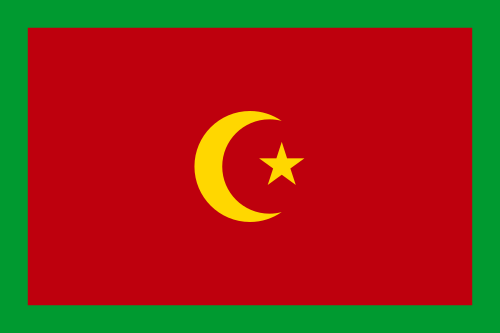
خیوه خانلیگی
Хивинское Xанство
Khanate of Khiva
The Khanate of Khiva is an Islamic Khanate, located in between Kazakhstan, Uzbekistan Turkmenistan, as well as the Caspian Sea in Central Asia. The capital of the Khanate is the ancient city of Khiva, but other large cities are present in the nation's borders, such as Aktau and Nukus. The khanate remained strong during the Soviet take-over of Centeral Asia and Turkestan, being the only khanate or nation to withstand the Communist front, through it's entirety, but, much of the success of the khanate should go to Britan, the Persian Empire-come-Iran, and several Arab Leauge nations. The khanate today is one of only 3 (the others being United Arab Emirates and Saudi Arabia) Islamic Khanates and Emirates, and is the northernmost of these nations.
1,345,000 people reside in the nation, with most living in the countries' 3 main cities, Khiva, the capital, Aktau, a port city on the Caspian Sea, and Nukus, a large metroilis on the Syr Draya river. After 1920, with the dissolving of Russian Turkestan, the Khanate of Khiva re-gained most of its lost territory to the west, and South, but never re-gained any land to the East, with the push of the Soviet Union blocking any plans for expansion. In 1922, the first Soviet-Khiva war was fought, with Khiva winning majority if the war, excluding the loss of a small portion of land on the Caspian Sea, lost to the Kazakh SFSR. Later on, in 1932, with further backing by the Britsh Empire, and the United States if America, Khiva successfully won the second Soviet-Khiva war.
Breifley in 1939, there was a third Soviet-Khiva war, but the Soviets withdrew due to the onset of the Nazi's and World War 2. Due to the war, and a change in the Soviet's management of war, a peace treaty was signed by both parties in 1947, which became commonly known as the Treaty of Birmingham. In 1956, Khiva and the Soviet Union decided on new borders, which gave the Soviet Union a cut-off peice of land, north of the Aral Sea, and the Khanate of Khiva a further portion of the Turkmen SFSR, and since then, the borders of the khanate have not changed. In 1991, with the Soviet Union collapsing, Khiva became allied with Kazakhstan, Uzbekistan and Turkmenistan, and these nations formed the Central Alliance, which later saw the addition of Azerbaijan, Tajikistan and Iran.
The Khanate to Remain fully Independent, Russian Aid Cut
Note: This is a scenario, in which posts begin in 1900 and end in 2015, over a prolonged period if time.
Khanate of Khiva
The Khanate of Khiva is an Islamic Khanate, located in between Kazakhstan, Uzbekistan Turkmenistan, as well as the Caspian Sea in Central Asia. The capital of the Khanate is the ancient city of Khiva, but other large cities are present in the nation's borders, such as Aktau and Nukus. The khanate remained strong during the Soviet take-over of Centeral Asia and Turkestan, being the only khanate or nation to withstand the Communist front, through it's entirety, but, much of the success of the khanate should go to Britan, the Persian Empire-come-Iran, and several Arab Leauge nations. The khanate today is one of only 3 (the others being United Arab Emirates and Saudi Arabia) Islamic Khanates and Emirates, and is the northernmost of these nations.
1,345,000 people reside in the nation, with most living in the countries' 3 main cities, Khiva, the capital, Aktau, a port city on the Caspian Sea, and Nukus, a large metroilis on the Syr Draya river. After 1920, with the dissolving of Russian Turkestan, the Khanate of Khiva re-gained most of its lost territory to the west, and South, but never re-gained any land to the East, with the push of the Soviet Union blocking any plans for expansion. In 1922, the first Soviet-Khiva war was fought, with Khiva winning majority if the war, excluding the loss of a small portion of land on the Caspian Sea, lost to the Kazakh SFSR. Later on, in 1932, with further backing by the Britsh Empire, and the United States if America, Khiva successfully won the second Soviet-Khiva war.
Breifley in 1939, there was a third Soviet-Khiva war, but the Soviets withdrew due to the onset of the Nazi's and World War 2. Due to the war, and a change in the Soviet's management of war, a peace treaty was signed by both parties in 1947, which became commonly known as the Treaty of Birmingham. In 1956, Khiva and the Soviet Union decided on new borders, which gave the Soviet Union a cut-off peice of land, north of the Aral Sea, and the Khanate of Khiva a further portion of the Turkmen SFSR, and since then, the borders of the khanate have not changed. In 1991, with the Soviet Union collapsing, Khiva became allied with Kazakhstan, Uzbekistan and Turkmenistan, and these nations formed the Central Alliance, which later saw the addition of Azerbaijan, Tajikistan and Iran.
The Khanate to Remain fully Independent, Russian Aid Cut
Note: This is a scenario, in which posts begin in 1900 and end in 2015, over a prolonged period if time.
Last edited: